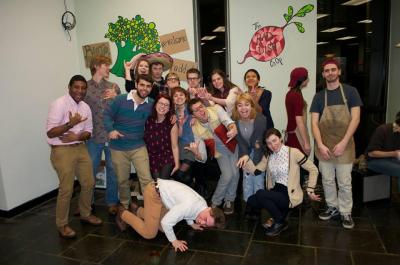But in a sunny room tucked away in one academic building, students at the Rad Dish Cafe are cooking up something different: salads made with produce from the Lancaster Farm Fresh Cooperative and local-food distributor Common Market, sandwiches on bread baked at Philadelphia's Wild Flour Bakery, coffee from local fair-trade roaster Greenstreet, and juices from Neuron Nectars, a Temple graduate's company.
This modest cafe represents a big idea. Members say it's the only student-run food cooperative in the city.
Such organizations - serving local, organic, and typically vegetarian fare made by and for students - have been springing up at colleges around the country.

 Most meals on Temple University's main campus are served by a huge, multinational food-services company, Sodexo.
Most meals on Temple University's main campus are served by a huge, multinational food-services company, Sodexo.
Add new comment